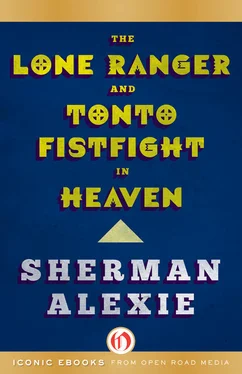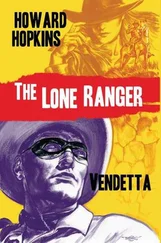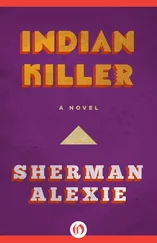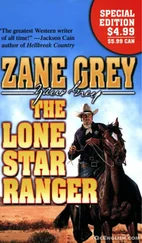Anyway, I sat there at the death table, writing letters from my death bed, when there was a knock on the door.
“Come in,” I yelled, knowing the door was locked, and smiled when it rattled against the frame.
“It’s locked,” a female voice said and it was a female voice I recognized.
“Norma?” I asked as I unlocked and opened the door.
She was beautiful. She had either gained or lost twenty pounds, one braid hung down a little longer than the other, and she had ironed her shirt until the creases were sharp.
“Honey,” she said. “I’m home.”
I was silent. That was a rare event.
“Honey,” she said. “I’ve been gone so long and I missed you so much. But now I’m back. Where I belong.”
I had to smile.
“Where are the kids?” she asked.
“They’re asleep,” I said, recovered just in time to continue the joke. “Poor little guys tried to stay awake, you know? They wanted to be up when you got home. But, one by one, they dropped off, fell asleep, and I had to carry them off into their little beds.”
“Well,” Norma said. “I’ll just go in and kiss them quietly. Tell them how much I love them. Fix the sheets and blankets so they’ll be warm all night.”
She smiled.
“Jimmy,” she said. “You look like shit.”
“Yeah, I know.”
“I’m sorry I left.”
“Where’ve you been?” I asked, though I didn’t really want to know.
“In Arlee. Lived with a Flathead cousin of mine.”
“Cousin as in cousin? Or cousin as in I-was-fucking-him-but-don’t-want-to-tell-you-because-you’re-dying?”
She smiled even though she didn’t want to.
“Well,” she said. “I guess you’d call him more of that second kind of cousin.”
Believe me: nothing ever hurt more. Not even my tumors which are the approximate size of baseballs.
“Why’d you come back?” I asked her.
She looked at me, tried to suppress a giggle, then broke out into full-fledged laughter. I joined her.
“Well,” I asked her again after a while. “Why’d you come back?”
She turned stoic, gave me that beautiful Tonto face, and said, “Because he was so fucking serious about everything.”
We laughed a little more and then I asked her one more time, “Really, why’d you come back?”
“Because someone needs to help you die the right way,” she said. “And we both know that dying ain’t something you ever done before.”
I had to agree with that.
“And maybe,” she said, “because making fry bread and helping people die are the last two things Indians are good at.”
“Well,” I said. “At least you’re good at one of them.”
And we laughed.
FIRST GRADE
MY HAIR WAS TOO short and my U.S. Government glasses were horn-rimmed, ugly, and all that first winter in school, the other Indian boys chased me from one corner of the playground to the other. They pushed me down, buried me in the snow until I couldn’t breathe, thought I’d never breathe again.
They stole my glasses and threw them over my head, around my outstretched hands, just beyond my reach, until someone tripped me and sent me falling again, facedown in the snow.
I was always falling down; my Indian name was Junior Falls Down. Sometimes it was Bloody Nose or Steal-His-Lunch. Once, it was Cries-Like-a-White-Boy, even though none of us had seen a white boy cry.
Then it was a Friday morning recess and Frenchy SiJohn threw snowballs at me while the rest of the Indian boys tortured some other top-yogh-yaught kid, another weakling. But Frenchy was confident enough to torment me all by himself, and most days I would have let him.
But the little warrior in me roared to life that day and knocked Frenchy to the ground, held his head against the snow, and punched him so hard that my knuckles and the snow made symmetrical bruises on his face. He almost looked like he was wearing war paint.
But he wasn’t the warrior. I was. And I chanted It’s a good day to die, it’s a good day to die , all the way down to the principal’s office.
SECOND GRADE
Betty Towle, missionary teacher, redheaded and so ugly that no one ever had a puppy crush on her, made me stay in for recess fourteen days straight.
“Tell me you’re sorry,” she said.
“Sorry for what?” I asked.
“Everything,” she said and made me stand straight for fifteen minutes, eagle-armed with books in each hand. One was a math book; the other was English. But all I learned was that gravity can be painful.
For Halloween I drew a picture of her riding a broom with a scrawny cat on the back. She said that her God would never forgive me for that.
Once, she gave the class a spelling test but set me aside and gave me a test designed for junior high students. When I spelled all the words right, she crumpled up the paper and made me eat it.
“You’ll learn respect,” she said.
She sent a letter home with me that told my parents to either cut my braids or keep me home from class. My parents came in the next day and dragged their braids across Betty Towle’s desk.
“Indians, indians, indians.” She said it without capitalization. She called me “indian, indian, indian.”
And I said, Yes, I am. I am Indian. Indian, I am .
THIRD GRADE
My traditional Native American art career began and ended with my very first portrait: Stick Indian Taking a Piss in My Backyard .
As I circulated the original print around the classroom, Mrs. Schluter intercepted and confiscated my art.
Censorship , I might cry now. Freedom of expression , I would write in editorials to the tribal newspaper.
In third grade, though, I stood alone in the corner, faced the wall, and waited for the punishment to end.
I’m still waiting.
FOURTH GRADE
“You should be a doctor when you grow up,” Mr. Schluter told me, even though his wife, the third grade teacher, thought I was crazy beyond my years. My eyes always looked like I had just hit-and-run someone.
“Guilty,” she said. “You always look guilty.”
“Why should I be a doctor?” I asked Mr. Schluter.
“So you can come back and help the tribe. So you can heal people.”
That was the year my father drank a gallon of vodka a day and the same year that my mother started two hundred different quilts but never finished any. They sat in separate, dark places in our HUD house and wept savagely.
I ran home after school, heard their Indian tears, and looked in the mirror. Doctor Victor, I called myself, invented an education, talked to my reflection. Doctor Victor to the emergency room .
FIFTH GRADE
I picked up a basketball for the first time and made my first shot. No. I missed my first shot, missed the basket completely, and the ball landed in the dirt and sawdust, sat there just like I had sat there only minutes before.
But it felt good, that ball in my hands, all those possibilities and angles. It was mathematics, geometry. It was beautiful.
At that same moment, my cousin Steven Ford sniffed rubber cement from a paper bag and leaned back on the merry-go-round. His ears rang, his mouth was dry, and everyone seemed so far away.
But it felt good, that buzz in his head, all those colors and noises. It was chemistry, biology. It was beautiful.
Oh, do you remember those sweet, almost innocent choices that the Indian boys were forced to make?
SIXTH GRADE
Randy, the new Indian kid from the white town of Springdale, got into a fight an hour after he first walked into the reservation school.
Читать дальше












